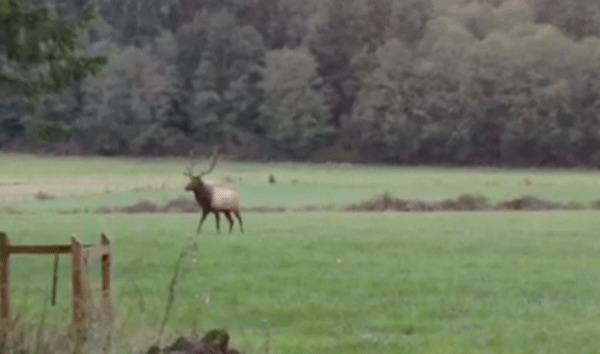For months, Sasha Castaneda told a tale that only seemed to raise eyebrows.
A tale about spotting an enormous bull elk, sporting a “huge” rack of antlers.
An elk so big and so still as she approached along a country road on North Whidbey in June that she was sure it was fake, clearly one of those life-size plastic imitations that people place in their yards.
She was convinced of that until she slowed down and got an up close look at the animal standing in a field just off the road.
“I was like, ‘Oh my God, this thing is huge,” she said. “When I looked at it, it turned. It looked at me. I kind of freaked out.”
Castaneda remembers speeding off on that June morning, around 6 a.m., and heading to work with one wild story to tell.
As it turned out, the tale wasn’t so wild after all.
What she described was the majestic elk that has been living outside Oak Harbor near Strawberry Point for more than a year now.
Initially spotted in September of 2012, the creature has appeared to take on a more permanent residence and is the only known elk living on Whidbey Island.
“He’s still a guest on our beautiful island,” said Ralph Downes, enforcement officer with the Washington Department of Fish and Wildlife.
Downes figured the elk would’ve moved on by now and made a return swim across Skagit Bay to the herd on the Skagit County mainland.
Calling it “Elk 101,” Downes said it’s not uncommon for a bull in a growing herd to split from the group and take a few cows with him.
For some reason, this bull saw greener pastures across the blue saltwater and went for a swim.
“That’s an easy swim for an elk,” Downes said. “They are powerful animals and excellent swimmers. Their hair is hollow, which assists them with bouyancy.”
What surprises Downes is that the elk didn’t return during the rut season in the fall.
He said he got reports in September from locals of what they thought was the sound of an elk bugling from the island’s eastern shores.
Those bugling sounds are an attempt to attract females.
Even though he didn’t attract companionship of his own kind, the elk decided to stay put.
For now.
Downes said that residents are protective of the majestic animal and assigned it a name, “Bruiser.”
Not lost among the concerns of local residents is the fear that a hunter might take a shot at the elk.
Although there are specific rules for hunting deer on defined dates this time of year on Whidbey Island, no such hunting season exists for elk on the island.
“According to recent history, we don’t have elk on Whidbey Island,” Downes said. “We don’t manage it. You don’t create a season to protect it from something if it doesn’t exist.”
But now an elk does wander North Whidbey.
It is likely that it came from North Cascade herd found along the Skagit River. According to one 2002 report from the Department of Fish and Wildlife, that herd peaked at 1,700 in 1984 yet sharply declined to about 300 by 2002.
“There’s always that worry that a bad apple is going to try to take an easy stab,” Downes said. “That being said, there is no legal season for elk hunting on Whidbey Island and it would be unlawful for anyone to harvest it.”
Russell Link, a Washington Fish and Wildlife biologist who lives in Clinton, said it’s been more than a century since elk were common on Whidbey Island.
Citing passages from Richard White’s book, “Land Use, Environment and Social Change: The Shaping of Island County, Washington,” Link said that elk numbers were already declining with the introduction of the gun to native Indians and white settlers completed the destruction of the animal in the 1850s.
Link said he’s never seen an elk on Whidbey Island in his 20 years as a resident.
Downes, who also lives on the island, has caught a glimpse. He’s starting to wonder how long it might hang around.
“As long as it’s getting the essentials, I don’t think it has any reason to move,” Downes said. “Apparently, it socializes well with the female black-tailed deer. The males move right away when it comes into the area.”
Castaneda said her husband saw the elk last month and caught it on video.
“Nobody believed me when I saw it,” she said.
“Then he saw it. I said, ‘I told you, I’m not going crazy.’”



